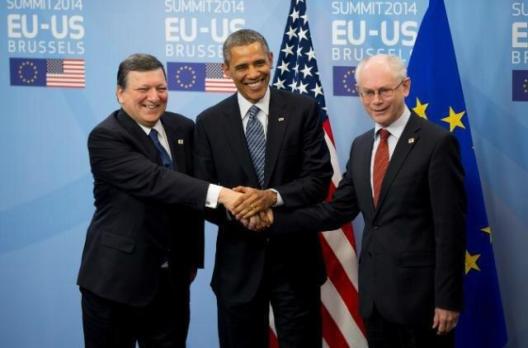 Ukraine and Russia dominated the EU-US Summit in Brussels today, followed by the original top priority items of the Transatlantic Trade and Investment Partnership (TTIP) and surveillance by the National Security Agency. But missing from the agenda was another issue that needs high-level transatlantic attention: the worrisome situation in the Arab transitioning countries, namely, Egypt, Libya, Tunisia and Yemen. While these countries may not seem to present an immediate crisis, the failure of successful democratic transitions there will have a direct, negative impact on European and US interests. The only way they can achieve lasting security and stability—what ultimately matters the most to Europe and the United States—is through the development of democratic systems.
Ukraine and Russia dominated the EU-US Summit in Brussels today, followed by the original top priority items of the Transatlantic Trade and Investment Partnership (TTIP) and surveillance by the National Security Agency. But missing from the agenda was another issue that needs high-level transatlantic attention: the worrisome situation in the Arab transitioning countries, namely, Egypt, Libya, Tunisia and Yemen. While these countries may not seem to present an immediate crisis, the failure of successful democratic transitions there will have a direct, negative impact on European and US interests. The only way they can achieve lasting security and stability—what ultimately matters the most to Europe and the United States—is through the development of democratic systems.
Danya Greenfield is the acting director of the Atlantic Council’s Rafik Hariri Center for the Middle East. She leads the Yemen Policy Initiative and writes extensively on Yemen, Jordan, and Egypt, as well as US assistance to the Arab world. Amy Hawthorne is a resident senior fellow with the Atlantic Council’s Rafik Hariri Center for the Middle East. She is a Middle East expert with extensive policy, analytical, and practical experience on Arab political reform and democracy promotion.
Image: Herman Van Rompuy, President of the European Council, and José Manuel Barroso, President of the European Commission with US President Barack Obama at the EU-US Summit, March 26, 2014. (Photo: European Council)
